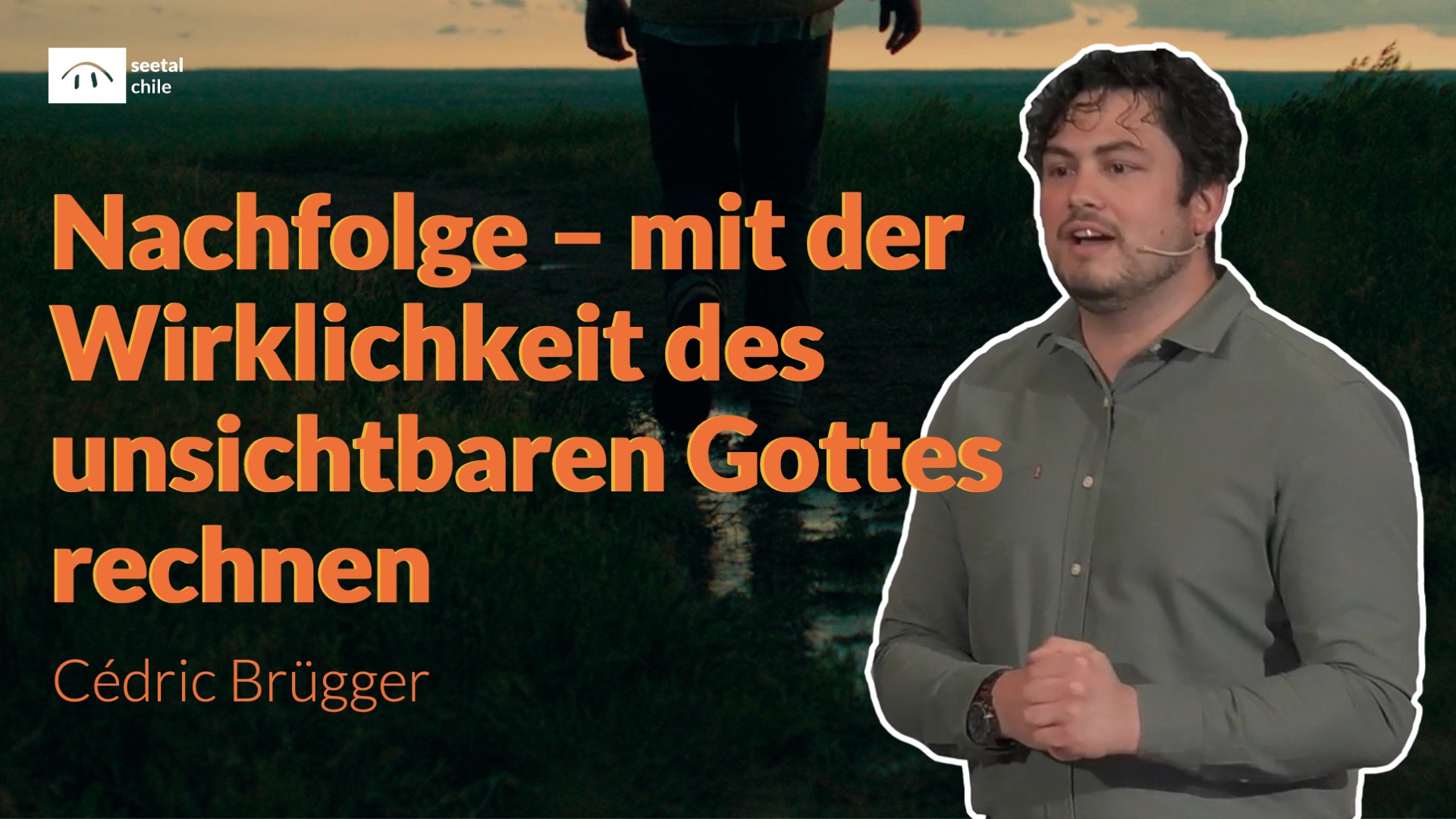Abel – role model without words
Series: Like you and me | Bible text: Genesis 4:1–15
The parents Adam and Eve gave their second son the name Abel, which is Touch or Invalidity means. This was promised to him again and again through his name. Words have power. Abel, despite his short life, became the first example of faith (Hebrews 11:4). Unlike Cain, he sacrificed the first and best to God. In the Sermon on the Mount, Jesus takes Abel to task. If he noticed that Cain had something against him, he should have approached him and addressed the problem.
In which event of world history did a quarter of the world’s population lose their lives? It was when Cain slew his brother Abel in the field. Last Sunday we looked at the story from Cain’s point of view. Cain became hot with envy when he realised that Abel experienced favour from God and he, in his opinion, did not. From his point of view, life and probably even God were unfair. Feelings of envy and anger overcame him and he beat his brother to death. Today we are looking at the question of whether there may have been a deeper difference between the attitudes of the hearts of the two brothers.
Words have power
It will remain a mystery to us why Adam and Eve gave their sons names with the following meanings: Cain (Acquired, Profit) and Abel (Touch, Invalidity). Thus, on that fateful day, the Profit the Invalidity. Omen est noun. Especially in Hebrew, the meaning of the names carried great weight. Why only did they name their second son Abel called?! Words have power. It is of great importance what we say about our children.
While studying for today’s Blessing of the Child, I researched the name Amélie. According to Germanic origin the name means The efficient one or the brave. One text also says: Originating from the Greek of a for missing and mélos for limb, it denotes the absence of limbs in newborns. For superstitious parents, this is certainly a reason to choose this name only at an advanced stage of pregnancy.
Words have power. Also what we convey to the children between the lines. Do we give them confidence, does their self-confidence grow or do we keep them fearful? Positively optimistic or negatively pessimistic? The tongue is like a small rudder that steers a big ship, or like a fire that sets the whole life on fire (James 3:4–6). God spoke a word and it happened. Words have incredible energy.
When God wanted to make Abraham the father of many nations, he changed Abraham’s way of speaking. At that time, Abraham did not have a single child because Sarah was barren. By changing his name from Abram (exalted father) to Abraham, which means «Father of many nations»(Genesis 17:5). From that day on, every time he met someone, he said: «Hello, my name is Father of Many Nations.«Every time dinner was ready, Sarah called out to Abraham: «Darling, father of many nations, dinner is ready!» Perhaps the neighbours even mocked: «The two of them want a child so badly that they have now gone completely crazy.«But God changed the way Abraham spoke so that he called forth what God had already blessed him with. God’s way is to call the things that are not as if they were there. In the beginning, there was darkness over the whole earth. God saw the darkness and said: «Let there be light!«And it became light. If it had been you or me, we would probably have said: «Wow, it’s dark in here!»
Talk is silver…
Not a single word is handed down to us about Abel. But this did not prevent God from putting him first in the list of examples of faith: «By faith, Abel offered a better sacrifice to God than Cain. God accepted Abel’s sacrifice to show that he was righteously spoken of in his eyes. And although Abel is long dead, he still speaks to us this way»(Hebrews 11:4 NL). Obviously, our faith is not shown in words but in deeds. James again: «A faith that does not lead to good deeds is no faith – it is dead and worthless»(James 2:17 NL).
How did Abel’s faith show itself? He celebrated better worship than Cain. What I find interesting in the text is the sentence: «After some time, Cain sacrificed part of his harvest to the Lord. And Abel also offered unto him of the firstborn lambs of his flock, and of their fat» (Genesis 4:3,4 NL). This different choice of sacrifices is the reason for the Jewish interpretation to say: Cain brings God the fruit that first came into his hand. He wanted to fulfil his religious duties and simply bears fruit. Abel, on the other hand, is determined to give God the best of what he has. In Cain’s hands is the «first-best», what he just found. But Abel had chosen the «first and best». The victims, but especially the attitudes behind them, were different.
Without Abel speaking a word, one senses in him an eagerness and a joy to please God. He does not ask: What must I do? What do I have to avoid? He just gives it to the full. He offered the best of his time and possessions to God. Like the woman with the anointing oil in Luke 7:37. At that time, such an anointing oil cost about 400 days» earnings. She did not regret anointing Jesus» feet with it. The request of this story to us is: Are you ready to leave the first and best for Jesus? Am I willing to sacrifice all that is valuable (family, friends, social position, personal achievements) and all that is useless (bike, tasteful house, clothes) for God? Or am I merely willing to give of my abundance, to fulfil my religious duties? God wants the first and best from you and not the first-best.
Abel, as a model of faith, can also be an encouragement for introverts. Perhaps he, too, considered himself only insignificant, a breath and nothingness. Nevertheless, he went down in the annals. Perhaps the words often get stuck in your throat when you would like to speak. Maybe that’s why you feel like an inferior Christian. You can expose these thoughts as false and send them away. Your life speaks louder than your words.
and sometimes also gold
Is silence always right? In the Sermon on the Mount, Jesus brings a retelling of the Cain-Abel story. «You have heard that in the Law of Moses it says: «You shall not kill. Whoever commits murder will be condemned». But I say: Even he who is only angry with someone will be condemned! Whoever says to his friend, «You fool!» awaits judgement. And whoever curses someone will be threatened with the fire of hell. So if you are standing before the altar in the temple to sacrifice, and it suddenly occurs to you that someone has something against you, then leave your sacrifice before the altar, go to the person concerned and reconcile with him. Only then come back and offer your sacrifice to God.» (Matthew 5:21–24 NL).
On the one hand, we learn from this that we are very quickly stuck in the role of Cain. Who hasn’t been angry with someone or called them a «fool»! On the other hand, an «Abel» should not just remain silent and fall into the victim role. I am sure that Abel perceived Cain’s scornful looks. He must have noticed that something was wrong in his relationship with Cain. As soon as he became even slightly aware of the discrepancy, it was his responsibility to address the matter. His parents, Adam and Eve, could also have helped him to follow a different path of faith. What would have happened if Abel had approached his brother and they had solved the problem together? Perhaps the drama could have been averted.
I have been an Abel a few times and noticed that someone reacts to me in a distant and somewhat strange way. This often triggers me to avoid that person rather than address my observation. According to my scheme, if anything, that person should address me and not me them. Jesus disagrees. Talk is silver, silence is gold, is the saying. There are situations where talking is worth its weight in gold.
Abel lived much less long than Cain and yet he is still considered a role model today. The length of our lives is not as important as who we live for. A short life, given in service to Christ, pleases God more than a long life full of selfishness and striving for nothingness. Dietrich Bonhoeffer died at the age of 39 in Buchenwald concentration camp because of his resistance to the Nazi regime, yet he left the world a tremendous legacy. In today’s world, one of the most important values is health and, as a consequence, a long life. Especially in the Corona crisis, it was clearly expressed: with an inconceivable amount of effort, people tried to prevent people from dying. Far be it from me to disregard human life, but I will nevertheless allow myself the question: Is it the highest goal to live as long as possible? Abel did not live very long and yet he left the world an example: «[…] And although Abel has been dead for a long time, he still speaks to us like this»(Hebrews 11:4 NL). Better a meaningful life than a long one! Hanspeter Royer, who died at the age of 51, once said: «We have no choice in how we die and when we die, but we do have a choice in how we live.»
In connection with Abel, I also thought of George Floyd during the last few days. The death of him has set off a huge wave of solidarity. Hundreds of thousands of people are raising their voices against racism and justice. After Abel’s murder there were no demonstrations – who would ;-) Instead, his blood cried out. The LORD said to Cain: «What have you done? Do you not hear: The blood of your brother cries out to me?»(Genesis 4:10 NL). God heard this cry. Jesus is God’s answer to it. When Christ rose from the dead, by God’s almighty power He bought back Abel’s life and yours for eternity. Jesus said: «I am life»(John 14:6).
Possible questions for the small groups
Read Bible text: Genesis 4:1–15; Matthew 5:21–24
- How have you experienced the power of words in your life (e.g. childhood)? How do you use them?
- What does it mean for us to offer the first and best to God? What would be the first-best?
- Jesus brings a new edition of the Cain-Abel story in Matthew 5:21–24. Besides the fact that we are not so far removed from Cain, this story also challenges Abel. What would have been a helpful intervention on his part? Can you think of your own examples where you should have reached out to people?
- Abel’s blood cries out for justice. Jesus is the answer. In what way does Jesus establish justice?






